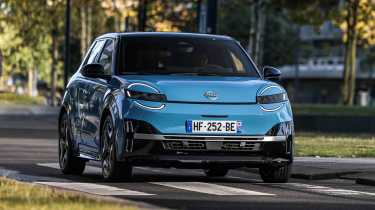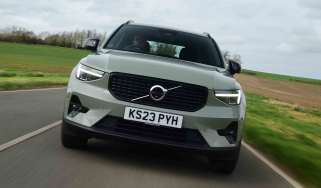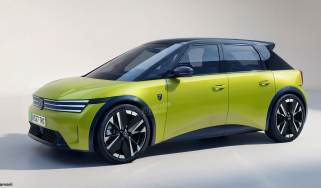Nissan Micra review
We find the Nissan Micra gets the electric supermini fundamentals right, but we just wish it were more distinctive

Our opinion on the Nissan Micra
The latest Nissan Micra draws (very) heavily from the Renault 5, so shares many of its highs and lows. But this is a good thing because we love the R5, and it means we have a similar admiration for the Micra.
Launching almost a year after the Renault means the Micra is on the back foot, and with the exact same pricing, you’ll have to look into the finer details to pick a clear favourite. The Nissan lacks the originality of its French counterpart, but there’s still plenty of unique design to give it its own character. There’s also slightly better claimed range figures for the Micra, although residual values are expected to be worse than the Renault 5’s, and leasing deals currently favour the French car.
This is still the best Micra in generations thanks to a combination of a funky interior, cute styling, decent efficiency and a well-balanced, fun-to-drive demeanour.
About the Nissan Micra
Nissan brought back the Micra in 2025 for its sixth generation, inspired by its involvement in the development of the Renault 5. Just like the French car, the Nissan is offered only with a five-door body, two battery options and two power outputs.
While the Renault 5 has the Renault Clio to provide a combustion-engined alternative, there are no petrol-powered Nissan superminis. The Micra is the smallest Nissan you can buy, sitting below the Nissan Juke, and with the new Nissan Leaf positioned as the next-biggest EV from the brand.
Used - available now

2019 Nissan
Micra
49,508 milesAutomaticPetrol1.0L
Cash £9,350
2022 Nissan
Micra
13,622 milesAutomaticPetrol1.0L
Cash £14,800
2017 Nissan
Micra
44,822 milesManualPetrol1.0L
Cash £7,475
2017 Nissan
Micra
51,766 milesManualPetrol1.0L
Cash £7,155So far, we've driven the latest Nissan Micra on its international launch, but we have driven its closely related Renault 5 sibling extensively in the UK, and anticipate the Micra to be equally competent when we get to try it on home soil.
Nissan Micra prices and latest deals
Prices start at around £21,500 for the entry-level 40kWh model, rising to just under £28,500 for a top-spec Micra with the larger 52kWh battery pack.
Nissan is among a growing number of manufacturers that qualify for the Government's Electric Car Grant (ECG) announced in July 2025. The Micra is one of two Nissan models eligible for the £1,500 grant, which is applied automatically when you buy. Given the Micra is still a new car to the UK market, there aren’t as many attractive finance deals compared to the Renault 5, which is offered from as little as £146 per month.
Performance & driving experience
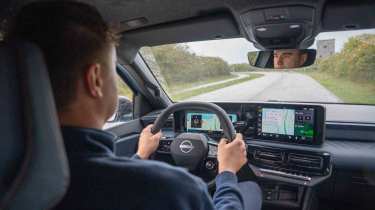
| Pros |
|
| Cons |
|
In a distinct contrast to the previous Micra generations, this latest all-electric one has been designed from the outset to be electric only. This doesn’t just mean the latest Micra is more expensive than its predecessors; it’s also physically bigger in order to fit its battery packs under the floor.
There are two different power outputs available, with the less potent version using a smaller capacity battery, while the more powerful one uses a larger capacity battery with greater electric driving range. The front-end is borrowed from normal supermini stock with a MacPherson strut-style suspension system, but the rear is more sophisticated and integrates a multi-link axle that’s unusual for the class – save for a MINI, and the sister Renault 5, obviously.
Nissan says that the suspension hardware and tuning in the Micra are the same as in the Renault 5, but it was involved in the development process and was able to influence the setup. Unlike a SEAT Ibiza or MINI Cooper, the Micra has rarely been one to offer driving thrills, so a grown-up driving personality was more on the cards anyway.
Performance, 0-60mph acceleration and top speed
Nissan will sell the Micra with two powertrain options in the UK, a base 40kWh model with 119bhp and a more powerful 52kWh model with 148bhp. Neither are firecrackers in terms of outright performance, but they offer good low-speed responses, helping the Micra feel nippy in and around town.
Acceleration isn’t too bad on paper, and the electric Micra will feel substantially quicker off the line compared to superminis of the past. The base 119bhp model will take 9.0 seconds to reach 62mph, while the 148bhp variant shaves a full second off that. These performance figures start to tail off at higher speeds, and both cars are limited to 93mph at the top end. This is partly due to the motor being relatively low geared for efficiency, and partly to the somewhat upright stance compromising aerodynamic efficiency.
| Model | Power | 0-62mph | Top speed |
| 40kWh | 119bhp | 9 seconds | 93mph |
| 52kWh | 148bhp | 8 seconds | 93mph |
Town driving, visibility and parking
The Micra’s suspension is secure and maybe a touch firm, but it’s never crashy. While a little vague on the straight-ahead, the light steering helps confidence on busier, tighter roads.
During our test drive, we found the performance to be a little lacking at higher speeds, even with the more powerful 148bhp electric motor – perhaps not a surprise given it tops out at 93mph. At low speeds, the motor feels responsive enough with its instant availability of torque, but like the Renault, the Micra’s throttle pedal remains a little springy, and switching from Comfort or Sport driving modes to Eco means that power feels overly drained. Around town, there’s a little pitter-patter to the ride on the comparatively large 18-inch wheels – the same size found on the Renault 5.
The Micra is easy to place on the road and park with its compact dimensions, although the latter is made easier because the rear-view camera’s resolution is pretty good on the main touchscreen. Nevertheless, overall visibility is decent, especially so when you’re looking forwards thanks to the upright seating position.
Country road driving and handling
Sharing its dynamism with the Renault 5, the Nissan Micra has plenty of grip, and feels stable enough in the bends thanks to the positioning of the battery low down and between the axles.
It’s not quite up on its toes like some petrol-powered superminis, but the response of the electric motors and brake pedal (no matter which brake regeneration mode you’re in) gives the Micra some levels of engagement. There’s potential for a hot Nismo variant in the future, which we would hope to have some distinguishing dynamics compared to its probable sister car, the Alpine A290.
Motorway driving and long-distance comfort
The Micra’s steering is a little busy on the motorway, but other than that, it feels like you could happily use up its entire 260-mile range in one go without feeling knackered at the end. It’s not the quickest at motorway speeds, but there’s enough punch to overtake slower moving trucks.
Refinement is good; the ride certainly settles at higher speeds, but the silent powertrain allows you to focus more on the wind noise around the door mirrors. We also like the personal safety button taken directly from the Renault 5, disabling lane-keep assist and other safety features at a push.
"The more powerful Micra feels nippy around town and at low speeds, but loses some of its verve on the motorway.” – Jordan Katsianis, senior staff writer.
Range, charging & running costs
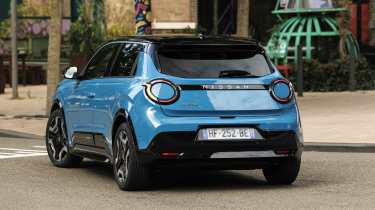
| Pros |
|
| Cons |
|
Nissan’s pair of powertrain options effectively put the Micra into two distinct categories. The 40kWh option is unashamedly directed at urban use, with 198 miles of range possible on the WLTP cycle. Efficiency and range will deteriorate at a consistent high speed cruise, so we’d suggest the larger 52kWh battery to anyone doing a lot of motorway journeys.
With the larger battery installed, the Micra’s range increases to 260 miles on the WLTP cycle, which is likely to drop to around 200 miles with some motorway usage. During our drive of the 52kWh Micra, we saw a maximum range of 220 miles after motorway, town and countryside driving in mixed weather conditions. Auto Express is currently running the closely related Renault 5 as part of a long term test, and we’re averaging efficiency of 3.9 miles/kWh, giving a theoretical range close to that 200-mile figure.
The Micra has a range increase of around nine miles compared to the 5, despite utilising the same platform and electric technology. We asked Nissan why this was, and it turns out the range gains are solely down to the Micra’s more aerodynamic bodywork.
Electric range, battery life and charge time
In order to bring it in at less than £22,000 without compromising on the high amount of standard kit, the Micra’s battery performance and charging speeds aren’t exactly groundbreaking.
The smaller 40kWh battery pack is limited to 80kW DC charging, which will top the battery up from 15 to 80 per cent in around 30 minutes. Nissan’s larger 52kWh option ups the charging speed to 100kW, helping retain the 30-minute 15 to 80 per cent top-up time. Both battery options feature an 11kW on-board charger for slower AC charging at home or at slower public chargers, although most will utilise a 7.4kW home wallbox charger. Such a charger will take 6.5 hours to fully recharge the standard range Micra, while the 52kWh Extended Range model takes 8.5 hours.
A nice addition that Nissan has over the Renault 5 is a set of paddles behind the wheel to easily adjust the regenerative braking. There are three settings, plus a full e-pedal mode that’s capable of bringing the car to a complete stop without the need to use the brake pedal. The Nissan forgets your chosen setting when turned off, however, so if you’re a serial e-pedal fan, you’ll need to re-select it every time you pull away. It’s annoying, but also a simple task to perform with the paddles, which are an upgrade on the ‘B’ selector in the Renault 5.
| Model | Battery size | Range | Insurance group |
| Standard Range | 40kWh | 198 miles | 19 |
| Extended Range | 52kWh | 260 miles | 22 |
Insurance groups
The Nissan Micra’s insurance groups range from 19 to 22, depending on the battery size and trim level. That’s to be expected for an EV of this size, with the Renault 5 ranging from group 18 to 22 and the Ford Puma Gen-E from 18 to 20.
Tax
The Micra’s pricing falls well below the £40,000 luxury car tax surplus, so it’s very cheap for private buyers to tax. The first year’s VED stands at £10 (up from £0 pre-April 2025), and will cost £195 a year in road tax thereafter.
Depreciation
The Micra trades on looks to stand out from the EV crowd according to Nissan, although we suspect its year-late arrival to the market has hurt residual values compared to the Renault 5’s. After three years and 36,000 miles, the Micra is expected to hold on to between 46 to 49 per cent of its value. Over the same time period, the Renault 5 is expected to maintain its value a little better, at between 49 to 51 per cent.
To get an accurate valuation for a specific model, check out our free car valuation tool...
Interior, design & technology
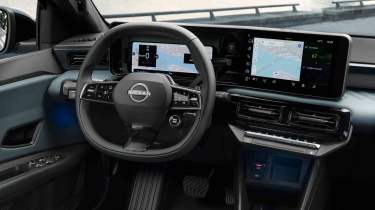
| Pros |
|
| Cons |
|
Fundamentally, the size, proportions and most of the glass of the Nissan Micra is shared with the Renault 5, but thanks to lots of clever changes, you could almost forget that the two are related.
Rather than the oblong shapes on the R5, the Micra instead uses oversized circular LED daytime running lights to frame the nose, with tiny rectangular headlights mounted within. All the important sheet metal has been changed, with simpler surfacing and a distinctive line running from the headlights through to the rear end.
The contrasting lower bumpers and wheelarches are finished in gloss black across all models, and all come with one of three 18-inch wheel designs that are unique to Micra. The most distinctive, in our opinion, are actually the plastic wheelcovers fitted to the entry-level model, which mimic the wheels of the Nissan Leaf.
The rear end is where things are the most distinctive. Nissan has fitted another round lighting motif and inset the rear screen. These are fundamental differences from the R5, and complete the job of separating the Micra from its French cousin. There’s also a range of bright colours and contrasting roof finishes to choose from, including a few blue and red options that you won’t find on the Renault.
As standard, Engage trim comes with the all-important heat pump (which provides a more energy efficient way of heating the interior in cold weather), 18-inch alloys, a seven-inch digital instrument cluster and a 10.1-inch infotainment system.
Our preferred mid-range Advance trim adds:
- Google maps embedded into the navigation system,
- Adaptive cruise control
- Front and rear parking sensors
- A reversing camera
- Blind spot monitoring.
Finally, the top-of-the-range Evolve (which is only offered on the larger-battery model) features a Harman Kardon sound system, heated front seats and steering wheel, plus two-tone metallic paint.
Interior and dashboard design
Inside, the cabin’s much closer to the R5’s, which is no bad thing. It feels well designed and comes full of interesting detailing, such as the waffle-cone rooflining and contrasting fabrics on the doors and dashboard. Without such an obvious retro connection, the colours and materials feel a little slicker, and depending on the model, actually ape the sportier Alpine A290.
The seating position is a little high, but then it needs to be to see over the screen housing, which feels a little clunky and plasticy in contrast to the thin, low-profile housings you see in other Nissan models.
One Renault-inherited element which we’re less fond of is the wand and stalk arrangement behind the steering wheel. There are no fewer than three different mechanisms with different controls to the right of the steering wheel, which can be confusing. One is the gear selector itself, which does without any form of ‘Park’ mode and forces you to select ‘Neutral’, which doesn’t come naturally.
Materials and build quality
You’ll find that overall, this Nissan’s build quality is very good for a supermini. Everything feels tightly screwed together and certainly as well built as its French counterpart. However, there are elements such as the large expanse of scratchy plastic on the centre console and doors, plus the squidgy leather on the dash, that might not fare well after a few years.
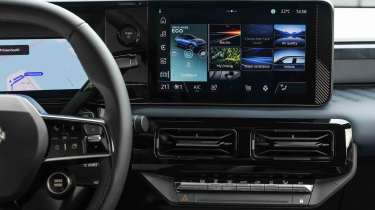
Infotainment, sat-nav and stereo
Nissan’s dual-screen layout feels high-spec and well executed for a car in this class, even if it's lifted directly from the Renault 5. As such, if you’re coming from a different Nissan model you’ll notice there’s not much in common between the systems, but this isn’t a problem.
The Micra's main 10-inch touchscreen is well sized and easy to use. Its menu structure is clear, and the always-visible menu bar and climate control elements make it easy to navigate. Our preferred mid-range Advance trim level has Google Maps directly embedded into the infotainment system, so you get active route planning, traffic alerts and even location data such as how many EV charging points are in use at public fast charging hubs.
If you log into your Google account, it’ll even show all your favourite locations and suggest different destinations based on the times of the day that you usually travel – this is surprisingly useful, if a little creepy. If you’re more of a Waze user, that’s also integrated right into the user interface. All in, it makes the Micra’s a much nicer system to use than the standard Apple CarPlay or Android Auto phone pairing set-up – although these are still fitted as standard with a wireless connection. Elements such as the Micra graphic for drive modes and car configuration on the main screen show Nissan has tried to make it look different to the Renault’s infotainment at least.
The driver’s display is configurable and shows key information with funky graphics, while still being clear. It can also display your navigation – regardless of which navigation app you’re using – but it can be a little laggy when changing between views.
“If you’ve spent any time in the Renault 5 you’ll notice plenty of similarities in the Nissan. The minor tweaks to the infotainment are good, although some more coherent design changes to give the Micra its own style would’ve been nice.” - Alastair Crooks, Senior News Reporter
Boot space & practicality
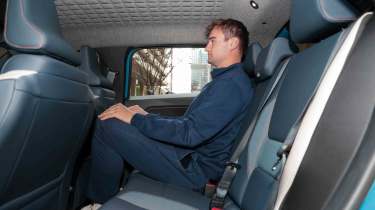
| Pros |
|
| Cons |
|
Such is the reality of small electric cars, that the Micra’s bloated external dimensions in relation to previous generations don’t exactly yield a corresponding growth in interior space. Just like the Renault 5, the Micra is a little tight inside, something exacerbated by the small windows, dark rooflining and tall dashboard.
Dimensions and size
At just under 4m long the Micra isn’t that much longer than its predecessor, but at nearly 90mm wider and around 45mm taller, it nearly headbutts C-segment cars from class above. This extra height is entirely due to the need to fit the battery pack under the floor, which has necessitated the entire car being raised.
| Dimensions comparison | |||
| Model | Nissan Micra | Renault 5 | Vauxhall Corsa Electric |
| Length | 3,974mm | 3,922mm | 4,060mm |
| Width | 1,830mm | 1,774mm | 1,745mm |
| Height | 1,499mm | 1,498mm | 1,433mm |
| Wheelbase | 2,541mm | 2,540mm | 2,540mm |
| Boot space | 326-1,106litres | 326-1,106litres | 267-1,081litres |
Seats & passenger space
In the front row, there is good small item storage, though, including decent-sized door bins, cupholders in the centre console and even an oddly-shaped storage compartment that’s about the perfect size for a set of wireless earbuds – Nissan (and Renault) knows who its intended audience is. For front occupants you’ll get plenty of headroom and decent legroom.
In the second row, the flat floor does mean that footroom isn’t too bad, but legroom and headroom are slightly limited, and the floor itself does sit quite high on account of the batteries being stored beneath.
Boot space
The Micra has a 326-litre boot, which is about average for the supermini class. Taking into account the car’s large dimensions, that figure isn’t particularly impressive. While the space is square and usable, the loading lip is quite high, compounded by the relatively high ride height.
You can fold the seats down in a 60-40 split, and when you do, space increases to a much more usable 1,106 litres. When folded, the seat bases don’t leave a flat floor. There’s also no under-floor or under-bonnet storage, so you’ll need to store the charging cables in the main space, which can be annoying if they are wet and/or grimy.
“The Micra isn’t the roomiest in its class, but for a supermini it’s not bad. Legroom in the back is the worst offender for practicality – adults in the back won’t want to stay there for long journeys.” - Alastair Crooks, Senior News Reporter
Reliability & safety
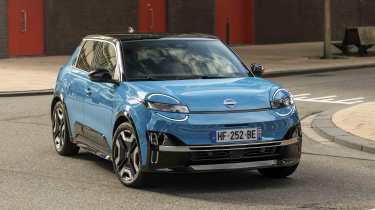
| Pros |
|
| Cons |
|
The one area where we think buyers would like a little more Japanese influence and a little less of the French is reliability, but the Micra is beholden to its Gallic underpinnings. However, there hasn’t been much poor reception to the Renault 5 so far, and being such a new model, that's an impressive feat.
Safety scores mimic the Renault 5’s four-star rating, and the testers gave the same reasons for penalising the Micra's rating as Renault, citing a lack of consistency in the car’s performance with differently sized occupants, and the fact that it lacks a centrally mounted front airbag. All versions come well equipped with safety assistance technology, but our preferred mid-range Advance trim adds blindspot monitoring, rear cross traffic alert with rear auto brake, and adaptive cruise control.
In our Driver Power survey in 2025, customers rated the Nissan Juke and Nissan Qashqai highly at 27th and 28th place, respectively. Nissan fared averagely in the Best Manufacturers survey, ranking 15th. The Renault 5 and the Nissan Micra are still too new for results to have come in from owners.
| Euro NCAP safety ratings | |
| Euro NCAP safety rating | Four stars (based in the 2024 Renault 5 result) |
| Adult occupant protection | 80% |
| Child occupant protection | 80% |
| Vulnerable road user protection | 77% |
| Safety assist | 68% |
Buying and owning
Our best buy: Nissan Micra 52kWh Advance
We haven’t driven the full range of Micras because it won’t reach UK roads until late 2025. However, judging by the Renault and its figures, we’d suggest that a mid-level Advance model with the 52kWh battery will be the best buy, thanks to a reasonable price, a competitive level of equipment, and good electric driving range.
While the 40kWh model will be cheaper to buy, there are other very inexpensive cars that have a better value equation – think of the likes of the new Fiat Grande Panda or Citroen e-C3.
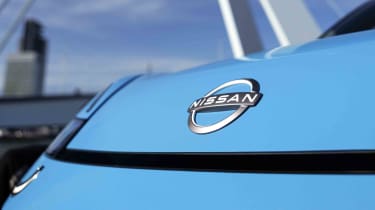
Nissan Micra alternatives
We can’t stop mentioning the Renault 5 in this review, and so it remains at the top of the list for alternatives. However, if you’re not so keen on the retro-chic design of the Renault and want something that looks a little more modern, the Micra is an excellent choice. Without firm pricing, we can’t say for certain which will be the better buy overall, but it’ll probably depend on the monthly payment – or what colour you prefer.
Outside of this pairing, Micras fitted with the smaller 40kWh battery could be put up against the Fiat Grande Panda or Citroen e-C3. Neither feels as well specified nor as substantial as the Nissan, but they are less expensive and have just as much charm. The BYD Dolphin Surf could be considered a rival too at its very high end, but the Nissan’s infinitely better across the board at its price point.
The larger 52kWh model will knock on the door of more expensive rivals, but will occupy a nice gap underneath something like an electric MINI Cooper or Peugeot E-208 - offering similar range and kit for less.
Deals on alternative cars to the Micra
Nissan Micra pictures
Frequently Asked Questions
The Nissan Micra kicks off at £21,495 when you add in the government’s electric car grant
